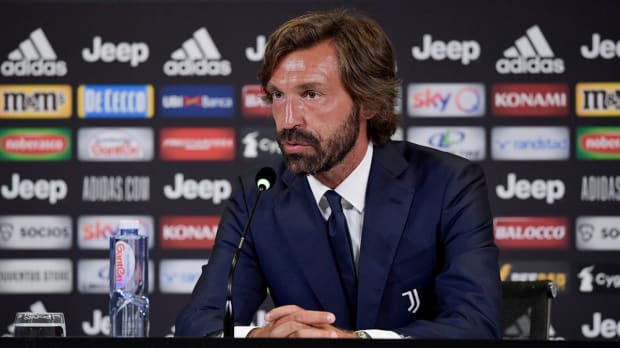Andrea Pirlo's managerial experience is limited to nine days as Juventus U-23 coach. So why was he installed as senior team manager within hours of Maurizio Sarri's ouster?
That Maurizio Sarri would be sacked if Juventus failed to progress past Lyon to reach the Champions League quarterfinals was widely expected, but when his dismissal came on Saturday, it didn’t change the sense of profound weariness at what football has become. He had, after all, won the league this season, but that for Juventus is no longer enough. This is the joyless truth for the modern elite: league titles have become so familiar that they mean almost nothing in themselves.
Far less anticipated was that Andrea Pirlo would be announced as his replacement within hours of Sarri's ouster, seemingly not considering any of the alternatives who may be available. It is, frankly, an extraordinary decision, one that smacks of a romantic punt on a club legend made more through hope than any carefully considered plan.
“Today begins a new chapter of his career in the world of football,” said a club statement. “As it was said about a week ago: from Maestro to Mister. From today he will be the coach for the Juventus people, as the club has decided to entrust him with the technical leadership of the first team, after having already selected him for Juventus Under-23. Today’s choice is based on the belief Pirlo has what it takes to lead, from his debut on the bench, an expert and talented squad to pursue new successes.”
It feels at the moment as though every club wants their own Pep Guardiola. They want their own former player, somebody steeped in the traditions of the club, who can do what Guardiola did in 2008 at Barcelona, taking over the club in a first senior coaching role and leading it to new heights. It’s one of the major reasons Manchester United appointed Ole Gunnar Solskjaer and Chelsea appointed Frank Lampard.
But Guardiola was appointed after an exceptional year in charge of the reserve side. It was a gamble, but one based on serious evidence. Solskjaer was appointed after winning championships in Norway. Even Lampard had a moderate level of success in his season in charge of Derby County in England's second tier. Pirlo has had nine days in charge of the Under-23s. Those first training sessions must have been sensational.
All of that raises its own questions. When Pirlo was appointed Under-23 coach, was he already being considered for the senior job? Were Juve directors already thinking they could shuffle him into the role if Juve was embarrassed by Lyon? Or is this a decision made on a whim in the past week, by directors whose actions have been increasingly erratic over the past couple of seasons?

It’s only been a year, of course, since Max Allegri was deposed after winning five league titles in a row, supposedly because his football was deemed less likely than Sarri to bring the Champions League title that Juve craves more than anything. And perhaps it was. But the decision would have been more convincing if Sarri hadn’t been expected to produce the free-flowing football of his Napoli side with Cristiano Ronaldo’s static individualism up front. Ronaldo remains a phenomenon, but to include him in the team is to accept that everything has to go through him, and that is not the Sarri way.
Pirlo was a cerebral player. The assumption is that the understanding of the angles of the game he demonstrated on the pitch will translate to tactical acuity from the bench, although that doesn’t always follow. His air of calm composure, similarly, leads to the assumption he will not have any problems with the more political aspects of the job. But all of that is unproven.
And whoever is in charge has to deal with the Ronaldo issue. He was the first of the board’s gambles to try to bring a first Champions League title to Turin since 1996, brought in at immense cost despite his being 33 at the time, under the assumption his goals and his capacity to perform at key moments were what Juve was missing. He has not disappointed, but his presence restricts how his side can play. To use late-period Ronaldo effectively, a club has to do what Zinedine Zidane did at Madrid and effectively build a team to service him, taking few risks and sitting deep in midfield.
Yet at the same time, the board seems to hanker after something more modern and progressive. Ronaldo is 35. He’s not getting any more mobile. He has no place in an expansive team. Nobody has any idea what sort of football Pirlo may favor–there is quite literally no evidence from which to draw–but it may be that the twin demands of Juventus's board are irreconcilable.